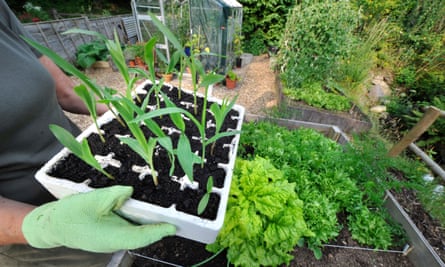Very little food waste goes into the compost bin in Conor Spacey’s house. Instead, leftover cake goes in the freezer until it can be rebaked, carrot tops are used for pesto, and the water from a tin of chickpeas makes a cream substitute.
While Spacey, a chef from Wexford in south-east Ireland, doesn’t eat meat, he has learned from butchers the value of using every piece of an animal, and applied it to fruit and vegetables.
His “vegetable butchery” means beetroot skins are used for chutney, over-ripe bananas for ketchup, stale bread for hummus, and any other leftover veg is mixed with spices and turned into kimchi.
But putting anything into the compost is seen as defeat.
“I get that putting things in the compost bin is better than it going to the general waste, but it is an easy way to go, ‘it’ll help someone’. I have a goal of making it so that everything can be used,” he says.
The cost of living crisis and concerns about sustainability have brought more calls for homes to reduce waste. A study from the climate action organisation Wrap reveals that more than 70% of food that is wasted in the UK comes from households – an amount worth £14bn every year. And researchers from the University of Sheffield recently found stark differences in the amount of food wasted by households that grow their own food, and those that buy everything from the supermarket.
Researchers Jill Edmondson and Boglarka Zilla Gulyas found that those who grow their own in fruit and veg in gardens and allotments typically waste just 3.4kg every year, compared with a national average of 68kg.
“The study suggests that someone who values, grows and is invested in food will be less likely to waste it, because they have invested time and effort in it,” says Edmondson. “If an apple had a bit of mould, the general population would probably chuck it away, whereas this cohort is more likely to use it.”
Research carried out in the past in Germany and Italy has suggested that the greatest amount of food waste comes from people who buy their groceries exclusively in large supermarkets.
Vegetable magic
Spacey has worked at reducing food waste over the last 15 years and has just brought out a book, Wasted, with a selection of “root-to-tip” recipes which aim to use every part of the vegetable. The main body of a carrot can be used for piccalilli, crisps or soup, and the leaves for salads and pesto; a beetroot can be pickled, while the stems and leaves can be used for salads. Leftover scones and banana bread can be mashed up and rebaked into “Chester cake”, or “donkey’s gudge”, typically sold cheaply by bakers.
 View image in fullscreenPeople who grow their own food are less likely to waste it because they have invested time in it. Photograph: Guy Harrop/Alamy
View image in fullscreenPeople who grow their own food are less likely to waste it because they have invested time in it. Photograph: Guy Harrop/Alamy
Inspiration comes from recent history – pickling vegetables, for example, was very popular two or three generations ago – and some unlikely sources. The idea of using banana skins in recipes came from a chef in Brazil, who was promised ham for a pasta dish to feed the needy but had to make do with banana skins.
When he teaches groups about avoiding food waste, Spacey says half are there for sustainability reasons, the other half to save money. “However, [even] if inflation drops back to 2-3%, and food prices start to fall back to where they were two years ago, I think people are more conscious now around the planet.”
He says supermarkets should bring out their own ranges of condiments and dishes based on food that would otherwise be wasted. And he has called for government intervention in the case of supermarkets which do not do enough to eradicate waste.
In August, the UK government was criticised for dropping new food waste legislation which, campaigners say, could have reduced prices as well as helping tackle the climate crisis by cutting waiste. It would have made food waste reporting mandatory for large and medium-sized businesses in England.
Start with the kids
With heightened interest in food sustainability issues, children are also being targeted with the minimum-waste message. Ocado, the online retailer, recently published a short cookbook for children in association with the Beano. Featuring a comic strip with Bananaman and Dennis the Menace, it has recipes which utilise some of the most frequently wasted kitchen ingredients, such as bananas and bread.
“Nearly gone-offee pie” uses bananas which are brown, while “soft ’n’ squishy tomato pasta” involves tomatoes that are no longer firm, and “Jammy Dodger french toast” uses slightly hard bread. Lesson plans on the same theme for primary school children have also been produced.
Recipe: how to make banana skin chutney
Ingredients
vegetable or rapeseed oil 1 tbsp
diced onion 250g
fresh red or green chillies 2 chopped
ground turmeric 2 tbsp
mustard seeds 1 tbsp
coriander seeds 1 tsp
green cardamom pods 2
over-ripe bananas 6, skins finely diced
regular banana 1, skin finely diced and fruit chopped
light brown sugar 1 tbsp
salt pinch
whole cloves 4
star anise 2
cinnamon stick 1
orange juice 500ml, plus extra if needed
Directions
Heat the oil in a pot over a medium heat. Add the onion, chillies, turmeric, mustard and coriander seeds and cardamom pods. Cook, stirring occasionally, for about 5 minutes, until soft.
Add the banana skins, chopped banana, brown sugar and a pinch of salt. Wrap up the cloves, star anise and cinnamon stick in a small clean cloth and tie it with string, then add this to the pot.
Pour in the orange juice, reduce the heat to low and cook for 10 minutes, stirring occasionally, until the skins have softened to a jam-like consistency.
Remove the cloth with the spices, then blend the chutney with a hand blender until semi-smooth. If it’s too thick, add a little more orange juice or water.
Allow to cool completely, then transfer to a sterilised jar and keep it in your fridge for up to two months.
From Wasted by Conor Spacey (Blasta Books)



